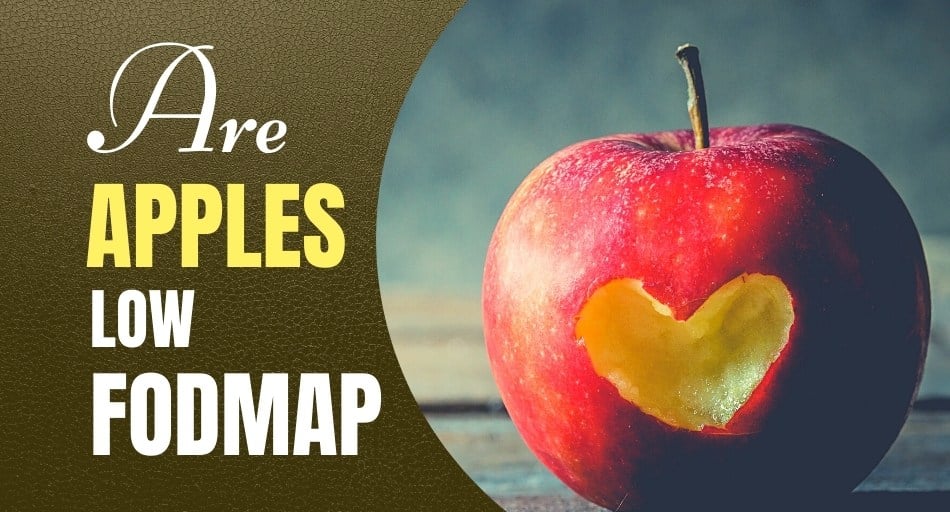A low FODMAP diet is often recommended for people with irritable bowel syndrome (IBS). This is because this type of diet can help ease the unpleasant symptoms of this condition.

A diet low in FODMAPs eliminates or limits foods containing a high amount of indigestible carbs. Because of that, it’s important to know what kinds of food are allowed on this type of diet.
For example, many common fruits contain a lot of carbs, so they may also contain FODMAPs. Let’s take a look at apples – are they high or low in FODMAPs?
Table of Contents
Are Apples Low FODMAP?
Apples are categorized as a high FODMAP food. As a result, they should be limited on a low FODMAP diet. They are allowed in small amounts, though, but it’s important to be careful with the serving size.
If your digestive system can tolerate small amounts of apples, it’s a good idea to have some from time to time.
This fruit is rich in vitamin C, fiber, potassium, and antioxidants – all of which are incredibly beneficial for your health. So, even small amounts of apples can be great for you.

How high in FODMAPs are apples?
A single apple of any kind is very high in FODMAPs. This is because they contain a lot of fructose, which is a type of FODMAP that’s hard for your body to digest. This type of sugar also worsens the symptoms of IBS and can trigger other digestive system issues.
On the other hand, some experts claim that you don’t have to eliminate this fruit from your diet altogether.
You can have small amounts of apple, but make sure to stick to a very small serving to avoid any other issues.
Can you eat apples on a low FODMAP diet?
Even though apples are very high in FODMAPS, some people with IBS may be able to consume small amounts of this fruit.
One apple is high in FODMAPS, but ¼ of a cup of sliced apples is considered moderated in these fermentable carbs. So, if your IBS isn’t severe, you might be able to enjoy this serving in a single sitting.

A serving of 20 g of sliced apple (or ⅛ of an apple) is low in FODMAPs, but it’s a very small quantity.
So, if you want to ingest as few FODMAPs as possible, you can try adding this amount of apple to a fruit salad containing other low FODMAP fruits like blueberries, melons, bananas, kiwi, or strawberries.
Is apple juice high in FODMAPs?
Most fruit juices, including apple juice, are very high in fructose. So, they should be avoided on a low FODMAP diet.
This is especially true for juices made with fruits that are very high in FODMAPs, and apples belong to this category.

Because of that, it’s best to avoid apple juice on a low FODMAP diet and choose other juices made with low FODMAP fruits.
Are cooked apples low in FODMAPs?
Unfortunately, cooking or stewing apples doesn’t lower their fructose content. Because of that, if you’re following a particularly low FODMAP diet, it might be best to avoid apples as much as possible.
If you know your body can tolerate small amounts of apples, you can still consume them, though. But make sure to stick to a small serving to avoid any IBS flareups.
Are apples good for you?
Apples are a very healthy fruit that’s rich in various nutrients. One medium-sized apple contains 3 g of fiber, which is 12% of your daily recommended for this nutrient.
The fiber found in apples is soluble, which has been shown to have positive effects on your heart.
Because of that, eating apples can lower your risk of heart disease and other cardiovascular issues.
Eating apples can also soothe other digestive system issues, such as acid reflux and GERD. This is because the fiber found in apples helps soak up excess stomach acid.

Apples are also an excellent source of vitamin C, providing you with 14% of your daily need for this nutrient.
Also called ascorbic acid, vitamin C is crucial for the growth, development, and repair of all your tissues.
It’s also important for the absorption of iron and a healthy immune system. Because of that, eating a lot of vitamin C-rich foods can reduce your risk of various diseases.
One medium apple also contains 195 mg of potassium, which is a great dose. This is an important mineral, as it works as an electrolyte, helping maintain fluid balance in your body.
What’s more, potassium helps offset the negative effects of sodium on your blood pressure.
This is important since too much dietary sodium raises your blood pressure, increasing your risk of strokes and heart attacks.
So, eating apples can help prevent these issues.
Even though apples contain quite a lot of sugar, studies show that eating them can actually lower your risk of diabetes.
Experts believe that it’s due to the plant compounds and fiber in apples. This fruit also contains substances that have anti-inflammatory properties, which means that they may reduce insulin resistance.

Apples are also high in powerful antioxidants, just like all fresh fruit. These plant compounds help flush out free radicals from your body, preventing oxidative damage to your cells.
Thanks to that, you’re at a lower risk of various chronic health issues like diabetes, heart disease, and even cancer.
Other antioxidants found in apples may also help protect your brain from damage. They also lower your risk of Alzheimer’s disease and dementia.
So, eating apples is a delicious way to stay healthy.
CONCLUSION:
Apples are categorized as a high FODMAP fruit, so they should be limited on a low FODMAP diet.
With that being said, some people can tolerate apples in larger servings, so always listen to how your body reacts to any new food.
It can be good to consume some apples every once in a while. This fruit is rich in antioxidants, fiber, and lots of micronutrients.
All of these help keep you healthy and lower your risk of diseases.
Sources: Nutrition Data, Monash University, National Library of Medicine, and PMC
